Diplomatic Bluebook 2019
Chapter 4
Japan's Diplomacy Open to the Public
Section 2 Supporting Japanese Nationals Overseas
1 Risks and Safety of Japanese Nationals Overseas
(1) Incidents and Accidents in 2018 and Countermeasures
A total of 17.89 million1 Japanese nationals traveled abroad in 2017 and approximately 1.35 million Japanese nationals live abroad as of October 2017. Securing the safety of Japanese nationals overseas and promoting their interests is one of the most important missions of MOFA.
There were no Japanese victims in terrorist attacks in 2018, despite the world seeing a large number of terrorist attacks. The recent tendency of terrorist attacks includes terrorism happening not only in the Middle East and Africa but also in Europe, the U.S. and Asia where many Japanese travel and reside. Both homegrown terrorism perpetrated by people born in Western countries and indoctrinated through websites or other means by foreign Islamic extremists and lone-wolf terrorism perpetrated by people acting solely with little organizational background are found in tremendous numbers. Additionally, terrorist attacks aimed at soft targets where large numbers of the general public gather everyday are on the rise. This tendency has not changed despite the fact that the Islamic State of Iraq and the Levant (ISIL), which in particular has been urging terror attacks outside its region, is losing its territory in Syria and Iraq. Also, foreign fighters of ISIL now are returning to their home countries or moving to third countries. These factors make it more difficult to predict and prevent terror attacks. The following incidents in 2018 demonstrate this tendency: the simultaneous suicide bombings at Christian churches in Surabaya, Indonesia in May; the shooting in Liege, Belgium in May; the terrorist bombing of a music festival venue in Fuheis, Jordan in August; the attack on a bus heading to a Coptic Orthodox Church in Minya Governorate, Egypt in November; the stabbings of pedestrians in Melbourne, Australia in November; the terrorist attack near the Chinese Consulate General in Karachi, Pakistan in November; the shooting at a Christmas market in Strasbourg, France in December, etc.
Incidents involving the death of a Japanese national overseas included: a stabbing in Dublin, Ireland in January; an armed robbery in the province of Manabí, Ecuador in March; a fall from a high place at a tourism spot in Lalibela, Ethiopia in April; an alligator attack in Florida, U.S. in June; a shooting in Cebu, the Philippines in August; an incident being hit by a streetcar in Istanbul, Turkey in September; a fire at a simple lodging in Seoul, Republic of Korea in November; a murder in Peten, Guatemala in November; and four mountain climbing deaths in Nepal and one in Pakistan.
Japanese nationals were also affected by various natural disasters in 2018, such as the earthquake in eastern Taiwan in February; the volcanic eruption of Kilauea on the island of Hawaii, U.S. in May; the earthquake on the island of Lombok, Indonesia in July; the earthquake and tsunami on the island of Sulawesi, Indonesia in September; and the flash flood at Petra Sacred Sites in Jordan in November. There were a number of incidents of political instability that could have affected Japanese nationals, such as the declaration of a state of emergency in the Maldives in February; the deteriorating situation in Gaza in November; and the ‘yellow vests movement' in France in November.
As was the case in the previous year, there were continued reports of the people falling ill during a trip abroad and dying at the hotel or other accommodations they were staying at.
In some of these accidents and illnesses, victims faced difficulties in dealing with higher medical and transportation costs, and receiving insufficient medical services compared to those in Japan.
As for infectious diseases, cases of Ebola were reported in the Democratic Republic of the Congo, and cases of the Middle East Respiratory Syndrome (MERS) continue to be reported in the Middle East. Mosquito-borne diseases, such as the Zika virus, yellow fever, Dengue fever and malaria, also continued to spread throughout the world.
MOFA issues “Overseas Travel Safety Information” on infectious diseases and air pollution in countries and regions where health and medical caution is required, to inform Japanese nationals overseas of the current outbreak situation and prevention measures.
- 1 Source: Ministry of Justice “Statistics on Legal Migrants”
<Tips for Traveling and Living Abroad>
As described above, incidents which threaten the safety of Japanese nationals have constantly occurred all around the world. In addition to registration to Overseas Travel Registration (Tabi-Regi) or submission of Overseas Residential Registration, important measures for Japanese nationals traveling and living abroad to secure their safety include: (1) checking security and other information through the Overseas Safety Website, media and other sources; (2) taking adequate safety measures to avoid risks; and (3) contacting the nearest Japanese diplomatic missions overseas and family in Japan in case of emergency. MOFA uses various tools and opportunities to call attention to this message. MOFA also continues to emphasize that it is very important to take out travel insurance with a sufficient coverage when traveling abroad since the lack of travel insurance will make it difficult to pay the medical expenses or to receive proper medical care in case of diseases and accident injuries due to expensive medical fees abroad.
(2) Safety Measures for Japanese Nationals Overseas
The number of cases where Japanese nationals received support or protection from the diplomatic missions and the Japan-Taiwan Exchange Association has stayed at a high level. In 2017, there were 21,309 by person and 19,078 by case2.
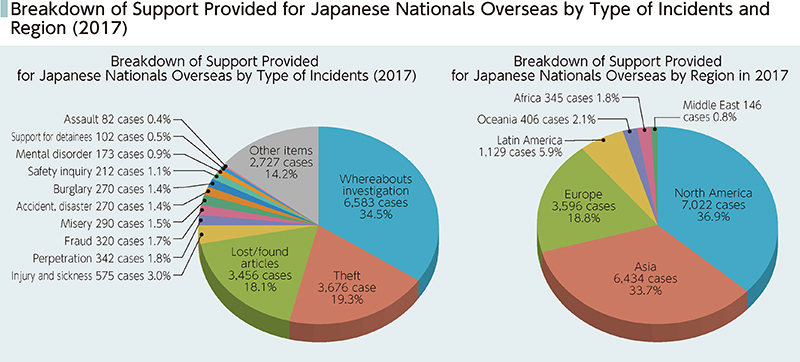
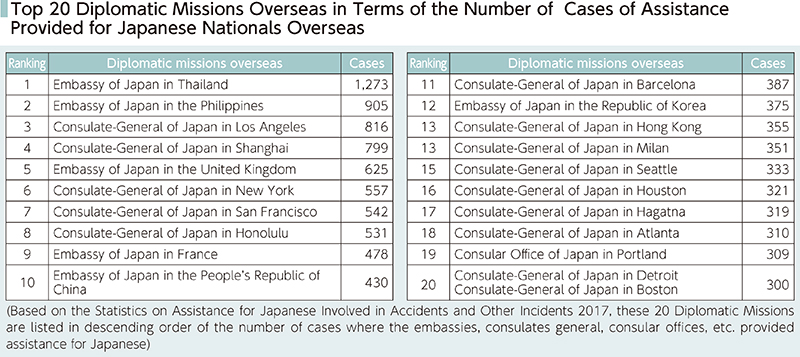
In order to avoid accidents and troubles overseas, it is important to collect information beforehand. As such, MOFA works to enhance the safety awareness of Japanese nationals and promote its safety measures by disseminating information.
MOFA issues the latest safety information worldwide on the Overseas Safety Website and emails the latest safety information of travel destinations and places of residence to Japanese nationals staying overseas with Overseas Residential Registrations and short-term travelers with registration in the Overseas Travel Registration (Tabi-Regi). Tabi-Regi is also available to those without travel plans through simple registration. The distributed safety information is widely utilized by Japanese businesspersons in charge of foreign operations. Since Tabi-Regi was launched in July 2014, MOFA has improved its user-friendliness and sponsored many activities to increase registrants. Currently, the cumulative total registration is more than 4 million.
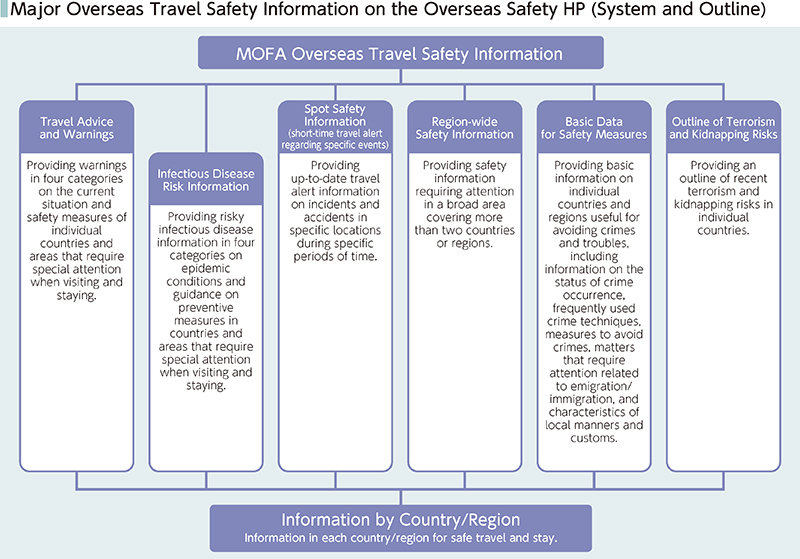
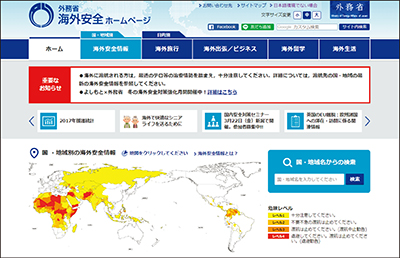 MOFA Overseas Safety Website
MOFA Overseas Safety Website(https://www.anzen.mofa.go.jp/)
 MOFA Overseas Travel Registration (Tabi-Regi)
MOFA Overseas Travel Registration (Tabi-Regi)https://www.ezairyu.mofa.go.jp/tabireg/index.html
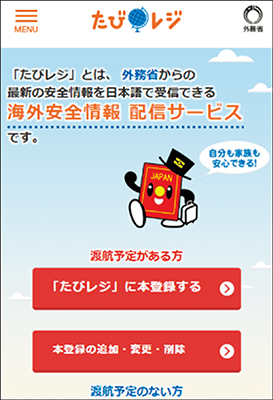 MOFA Overseas Safety App Overseas safety website “About the Overseas Safety App Services” can be downloaded from
MOFA Overseas Safety App Overseas safety website “About the Overseas Safety App Services” can be downloaded from (http://www.anzen.mofa.go.jp/c_info/oshirase_kaian_app.html)
MOFA strives to enhance the knowledge and capability of the Japanese people concerning overseas safety measures and crisis management through seminars and trainings. MOFA has hosted safety measure seminars in and out of Japan and sent lecturers from the Consular Affairs Bureau to seminars nationwide organized by other organizations and associations (around 80 times in 2018). MOFA also hosted Public-Private Joint Practical Training for Counter-Terrorism and Anti-Kidnapping Measures with the participation from private companies. These efforts are beneficial not only for taking preventive measures against dangers like crime and terrorism, but also for enhancing response capabilities in case of emergency.
Public and private cooperation is also proceeding overseas. The diplomatic missions overseas host regular meetings of Security Consultation and Liaison Committees with local Japanese nationals to share information, exchange opinions and bolster collaboration in preparation for emergencies.
After the terrorist attack in Dhaka in July 2016, MOFA has worked to enhance the awareness of safety measures and the response capabilities of international cooperation personnel, small and medium enterprises, students studying abroad, short-term travelers and others who have limited access to information on safety.
First, MOFA launched the Small and Medium Enterprise Overseas Safety Measures Network, with the participation of 29 organizations and agencies related to overseas expansion of Japanese businesses in September 2016, in order to support SMEs, which account for the vast majority of Japanese companies. The collaboration among members in this network has strengthened safety measures of those companies, such as raising safety awareness through seminars and newsletters, establishing horizontal relationships among participating companies, seeking to provide better support services for business, etc. Furthermore, in March 2017, MOFA released Golgo 13's Security Guidelines for Japanese SMEs abroad, which explains the minimal and basic safety measures for the companies in an easy-to-understand manner using famous manga (cartoons). After its release, about 110,000 copies of the fine printed version have been distributed and the special webpage has gotten about 1.7 million views, which shows that the guidelines have been used by Japanese businesses widely and contributed to raising awareness on overseas safety measures.
 ©Takao Saito Golgo 13's Security Guidelines for Japanese SMEs Abroad
©Takao Saito Golgo 13's Security Guidelines for Japanese SMEs Abroadhttp://www.anzen.mofa.go.jp/anzen_info/golgo13xgaimusho.html
As for Japanese students studying overseas, MOFA is working to enhance their awareness of safety measures and aid in the establishment of crisis management systems at schools. MOFA sends lecturers to universities and other educational institutions, many of which have insufficient knowhow or experience on safety measures and emergency responses. MOFA is going forward with efforts to connect government agencies with educational institutions, overseas study agencies and students by such means as beginning automatic registration to Overseas Travel Registration (Tabi-Regi) with some overseas study institutions.
As for safety measures for short-term travelers, MOFA is engaged in PR activities mainly focused on the promotion of registration of Tabi-Regi through appointment of Kendo Kobayashi as Tabi-Regi Registration Promotion Ambassador and cooperation with Yoshimoto Kogyo Co., Ltd. and others (See Column “About Tabi-Regi (Interview with Ambassador Kendo Kobayashi)”.).
MOFA took out advertisements in various media outlets, hosted a booth at Tourism EXPO Japan, and hosted a seminar on five occasions for tour guides of travel companies who escort travelers in an effort to convey the importance of working on safety measures and to call for cooperation in developing safety measures for travelers.
- 2 The Statistics on Assistance for Japanese Involved in Accidents and Other Incidents, first published in 1986, is an annual report on the number of cases/people where the diplomatic missions overseas and the Japan-Taiwan Exchange Association provided assistance to Japanese nationals involved in any kind of troubles overseas, such as incidents/accidents, acts of committing crimes and falling victim to crime or disaster.
<What is Tabi-Regi?>
Q: First of all, please tell us the benefits and appeals of Tabi-Regi.
Ambassador Kenkoba: Traveling abroad is a great thing and fun. But, for some reason, you feel anxious until right before the departure, don't you? You might also be concerned about what to do if you run into trouble at your destination. You might often see people milling around the overseas travel insurance counter at the airport. Insurance is important, too. But, if you're registered with Tabi-Regi, you'll receive the necessary information by email and safety confirmation from the Ministry of Foreign Affairs in an emergency while abroad. With this extra reassurance, you can genuinely let yourself go and enjoy your travel. It makes you feel better.
Q: What kind of information can you receive?
Ambassador Kenkoba: For example, I traveled to New York for my summer vacation and received an email from Tabi-Regi suggesting that I had better not visit a certain area during certain hours due to a planned power outage in the area. That was really helpful. You wouldn't know this information traveling normally without the service.
Q: Is Tabi-Regi useful?
Ambassador Kenkoba: Just by inputting your travel destination and period, you can receive a steady flow of information about “things that are happening now” in Japanese.
Q: Have you ever had a problem while traveling abroad?
Ambassador Kenkoba: Well, I have, and it has to be something I can talk about here, right (laughs)? A typical case is alcoholic drinks not being sold after midnight, or being banned during certain periods in certain countries. Sorry to just be talking about alcohol (laughs).
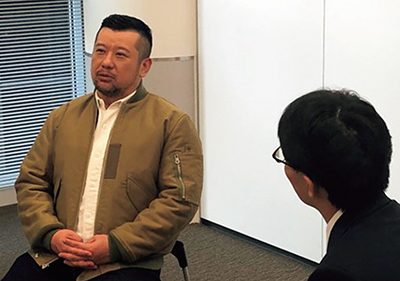
Q: That's fine (laughs).
Ambassador Kenkoba: More seriously, when I visited Shanghai for work before, I couldn't leave my location and was stuck there for a few hours because authorities were keeping people off the streets due to a visit by the vice president of some country. I also had an experience where I wandered into a very dangerous area in a part of San Francisco without knowing. I shuddered afterwards. If I was registered with Tabi-Regi at the time of those travels, I might have been aware of those circumstances ahead of time and I could have left earlier or taken a different route.
<Activities as the Ambassador in charge of promoting Tabi-Regi registration>
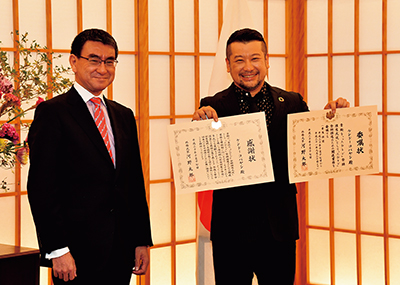 Ambassador Kenkoba receiving a letter of appreciation and a letter of appointment from Foreign Minister Kono
Ambassador Kenkoba receiving a letter of appreciation and a letter of appointment from Foreign Minister Kono
Q: Currently, only about 10% of overseas travelers register with Tabi-Regi. Foreign Minister Kono requested that you aim to boost the registration rate to 100%. What activities are you planning as the Ambassador in charge of promoting Tabi-Regi registrations?
Ambassador Kenkoba: I hope to promote this service broadly using videos and posters. I also intend to be involved in grass-roots activities. I'm wandering around Haneda and Narita airports, so feel free to say hello to me anytime. Then, I'll tell you about Tabi-Regi too (laughs).
Q: The number of people travelling abroad is steadily growing and could surpass 19 million a year.
Ambassador Kenkoba: While 19 million is a massive number, I hope to promote wider use of Tabi-Regi since I've personally benefited from its convenience.
Q: Finally, please share a message with everyone.
Ambassador Kenkoba: Being well prepared means no worries. Register with Tabi-Regi to feel more reassured and safer, and let's grab a drink together if we run into each other abroad. There I go. Back to talking about drinking again (laughs).

